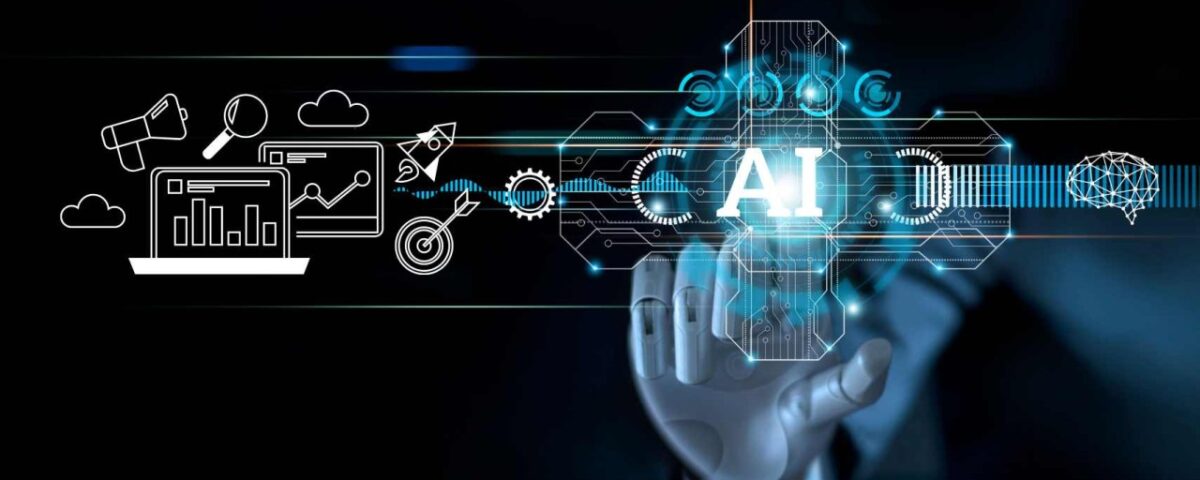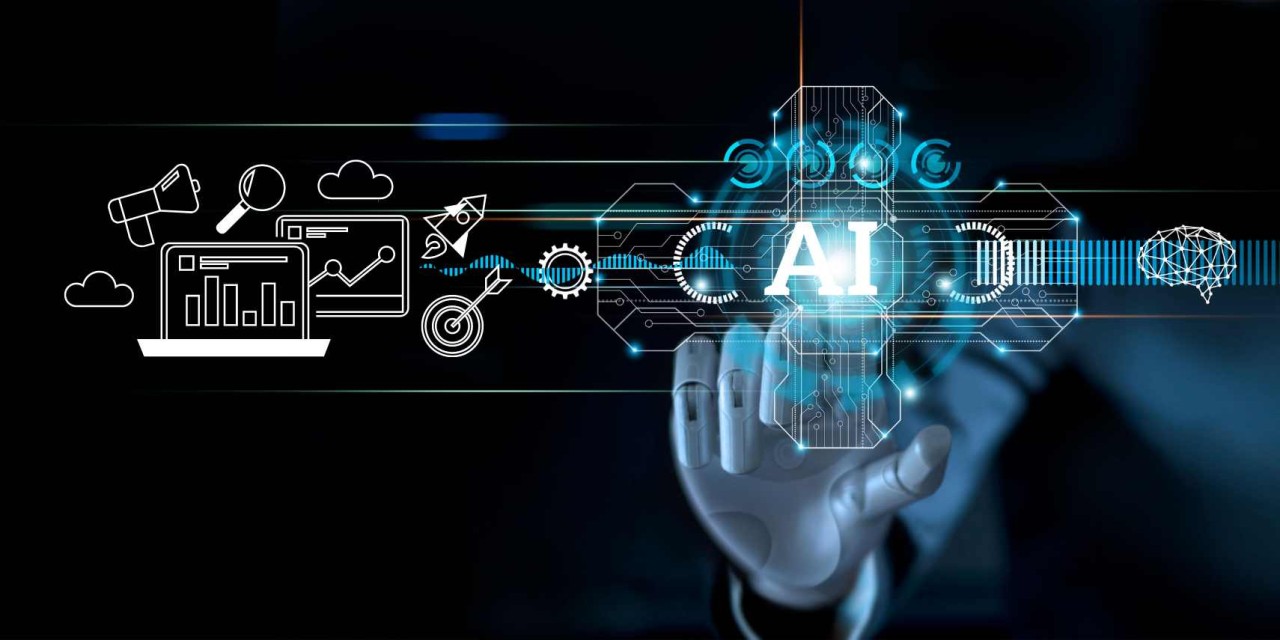
Sprout Social and AI: The Ultimate Marketing Duo You Can’t Ignore
August 26, 2024
Why Grammarly is More Than Just an Editing Tool for Marketers
August 28, 2024Artificial intelligence (AI) has rapidly become a cornerstone of digital marketing, transforming how businesses engage with customers, optimize campaigns, and make data-driven decisions. Over the past few years, we’ve seen AI evolve from a futuristic concept to a practical tool that offers tangible benefits in everything from personalized content creation to predictive analytics. As we step into 2024, the evolution of AI in digital marketing shows no signs of slowing down. Instead, it is poised to introduce even more advanced capabilities that could reshape the landscape once again.
In 2024, AI is expected to deepen its integration into digital marketing strategies, offering more refined tools that enhance automation, personalization, and real-time analytics. With these advancements, marketers will be able to create even more tailored and responsive campaigns, leading to higher engagement rates and better returns on investment. For instance, AI-driven chatbots will become more sophisticated, providing human-like interactions that improve customer service and conversion rates. Similarly, AI’s role in content creation will expand, allowing for the automatic generation of not just text but also multimedia content that is aligned with audience preferences.
Another key area of growth is in predictive analytics, where AI will continue to improve in forecasting consumer behavior and market trends. This will enable marketers to anticipate customer needs more accurately and adjust their strategies in real-time, ensuring that their campaigns are always relevant and effective. Additionally, as privacy concerns grow, AI will play a crucial role in developing compliant and ethical marketing practices, balancing the need for personalization with the importance of data protection.
The future of AI in digital marketing is not just about enhancing existing practices but also about exploring new frontiers. From AI-driven creativity that pushes the boundaries of design and messaging to hyper-targeted ads that reach consumers at the perfect moment, 2024 promises to be a year of significant innovation. For marketers, staying ahead of these trends will be critical to maintaining a competitive edge in an increasingly AI-driven world.
A Brief Look Back: The Early Days of AI in Marketing
The journey of AI in digital marketing began with simple automation tools and data analytics. Initially, AI was used to automate repetitive tasks, such as email marketing campaigns and social media posts. These early applications allowed marketers to save time and resources while maintaining consistent customer engagement.
As AI technologies advanced, so did their applications in marketing. Machine learning algorithms began to analyze large datasets, providing insights that helped marketers better understand customer behavior and preferences. This shift marked the beginning of more personalized marketing efforts, where AI could segment audiences based on their interactions and tailor content to individual needs.
The Current State of AI in Digital Marketing
Today, AI is deeply embedded in digital marketing strategies across various industries. Its capabilities have expanded beyond basic automation and data analysis, enabling marketers to create more personalized, targeted, and effective campaigns. Let’s explore some of the key areas where AI is currently making a significant impact:
1. Personalization at Scale
One of the most profound ways AI is shaping digital marketing is through personalization. AI-driven tools can analyze customer data, such as browsing history, purchase behavior, and social media activity, to create highly personalized marketing messages. This level of personalization goes beyond just using a customer’s name in an email; it involves tailoring content, product recommendations, and offers based on individual preferences and behaviors.
For example, AI can power recommendation engines that suggest products or content that a user is most likely to engage with. This not only enhances the customer experience but also increases conversion rates, as customers are more likely to respond positively to personalized recommendations.
2. AI-Powered Content Creation
Content is king in digital marketing, and AI is helping marketers produce content more efficiently and effectively. AI tools can now generate written content, such as blog posts, social media updates, and product descriptions, that are indistinguishable from those written by humans. These tools can also create visual content, such as graphics and videos, tailored to specific audiences.
AI-driven content creation is particularly valuable for scaling marketing efforts. Businesses can maintain a consistent content output without overwhelming their creative teams, allowing them to focus on more strategic tasks. Additionally, AI can optimize content for SEO by analyzing keywords, trends, and competitor content, ensuring that the material reaches the intended audience.
3. Enhanced Customer Support with AI Chatbots
AI-powered chatbots have become a staple in digital marketing, providing instant customer support and improving the overall user experience. These chatbots can handle a wide range of customer inquiries, from answering frequently asked questions to processing orders and providing personalized product recommendations.
What sets modern AI chatbots apart is their ability to learn and improve over time. By analyzing past interactions, they can better understand customer intent and provide more accurate and helpful responses. This not only enhances customer satisfaction but also frees up human agents to handle more complex inquiries.
4. Predictive Analytics for Proactive Marketing
Predictive analytics is another area where AI is making significant strides. By analyzing historical data, AI can forecast future customer behaviors, trends, and market shifts. This allows marketers to be proactive rather than reactive in their strategies, making informed decisions that align with future market demands.
For instance, predictive analytics can help businesses identify potential leads who are most likely to convert, allowing them to allocate resources more effectively. It can also forecast customer churn, enabling companies to implement retention strategies before losing valuable customers.
5. AI in Advertising: Smarter Ad Targeting
Advertising has always been a critical component of digital marketing, and AI is taking it to new heights. AI-powered advertising platforms can analyze vast amounts of data to identify the best audiences for specific ads, optimizing ad placements, timing, and messaging.
Programmatic advertising, which uses AI to automate the buying of digital ads, is becoming increasingly popular. This approach allows marketers to target ads more precisely, ensuring they reach the right audience at the right time. The result is a more efficient ad spend and higher ROI.
6. Voice Search and AI Assistants
Voice search is rapidly gaining popularity, and AI is at the heart of this trend. AI-powered voice assistants like Siri, Alexa, and Google Assistant are changing how consumers search for information online. As a result, marketers must adapt their strategies to optimize for voice search, which often involves more conversational and long-tail keywords.
In 2024, we can expect AI to further refine voice search capabilities, making it easier for businesses to connect with customers through this channel. This will involve optimizing content not only for traditional search engines but also for voice-activated devices.
What’s Next in 2024? Emerging Trends and Innovations
As we look ahead to 2024, several emerging trends and innovations in AI are poised to further transform digital marketing. Here’s what marketers should keep an eye on:
1. Hyper-Personalization
While personalization has been a major focus in recent years, 2024 will see the rise of hyper-personalization. AI will enable marketers to create even more tailored experiences by analyzing data at a granular level. This could involve everything from personalized product recommendations based on real-time behavior to dynamic website content that changes based on a user’s preferences.
Hyper-personalization will also extend to customer journeys, with AI predicting the next steps a customer is likely to take and delivering content or offers that guide them along the path to purchase. This level of personalization will not only enhance customer satisfaction but also increase brand loyalty.
2. AI-Driven Creative Design
AI is set to play a more significant role in the creative aspects of digital marketing. In 2024, we can expect to see AI tools that assist in designing marketing materials, from websites and logos to ad creatives and social media content. These tools will leverage machine learning to analyze what types of designs perform best with specific audiences, allowing marketers to create visually appealing content that resonates with their target demographics.
Moreover, AI will enable real-time testing and iteration of creative assets, allowing marketers to optimize their designs on the fly. This will lead to more effective campaigns that are continuously refined based on performance data.
3. AI and Data Privacy
As AI continues to evolve, so too will concerns around data privacy. In 2024, we can expect to see advancements in AI that focus on ensuring data privacy while still allowing for effective marketing. AI-driven tools will help businesses comply with data protection regulations, such as GDPR and CCPA, by automating data management processes and providing transparency into how customer data is used.
Additionally, AI will play a role in developing privacy-first marketing strategies that prioritize customer trust. This could involve using AI to anonymize data while still allowing for personalization or leveraging AI to create predictive models that don’t rely on personal data.
4. AI in Influencer Marketing
Influencer marketing has become a powerful tool for reaching targeted audiences, and AI is set to make it even more effective in 2024. AI-powered platforms can analyze social media data to identify the most relevant influencers for a brand’s target audience. These tools can also predict an influencer’s impact on a campaign, helping marketers choose the right partners for their goals.
Moreover, AI will enable more precise measurement of influencer marketing ROI, providing insights into which influencers are driving the most engagement, conversions, and brand awareness. This data-driven approach will allow marketers to refine their influencer strategies for maximum impact.

5. Augmented Reality (AR) and Virtual Reality (VR) Integration
AR and VR technologies are becoming more accessible, and AI will play a crucial role in integrating these technologies into digital marketing strategies. In 2024, we can expect to see AI-driven AR and VR experiences that allow customers to interact with products in new and immersive ways.
For example, AI could power virtual try-on experiences for fashion or beauty products, where customers can see how an item looks on them before making a purchase. Similarly, AI-driven VR experiences could allow customers to explore a virtual store or take a guided tour of a product in a way that enhances their understanding and engagement.
The Future of AI in Digital Marketing: Challenges and Opportunities
While the future of AI in digital marketing is undoubtedly exciting, it also comes with challenges that marketers must navigate. One of the biggest challenges is ensuring that AI-driven marketing efforts remain ethical and transparent. As AI becomes more powerful, there is a risk of over-reliance on algorithms that may unintentionally reinforce biases or compromise data privacy.
Marketers must also be mindful of the balance between automation and human creativity. While AI can handle many tasks efficiently, it cannot replicate the nuanced understanding and emotional intelligence that human marketers bring to the table. Successful digital marketing strategies will need to strike a balance between leveraging AI’s capabilities and maintaining the human touch that connects with customers on a deeper level.
On the flip side, the opportunities presented by AI are vast. Businesses that embrace AI will be better positioned to stay ahead of the competition, offering personalized experiences that drive engagement and loyalty. By investing in AI tools and staying informed about the latest developments, marketers can unlock new levels of efficiency, creativity, and effectiveness in their campaigns.
Conclusion: Preparing for the AI-Driven Future of Digital Marketing
As we move into 2024, the evolution of AI in digital marketing shows no signs of slowing down. From hyper-personalization and AI-driven creative design to advancements in data privacy and influencer marketing, AI is set to further transform the industry in ways that will reshape how businesses connect with their customers.
To thrive in this AI-driven future, marketers must stay informed about emerging trends and be willing to adapt their strategies accordingly. By embracing AI and leveraging its capabilities, businesses can create more personalized, efficient, and impactful marketing campaigns that resonate with their audiences and drive long-term success.
The future of digital marketing is bright, and AI is at the forefront of this exciting journey. As we continue to explore the possibilities, the key to success will be finding the right balance between technology and human creativity, ensuring that AI enhances rather than replaces the unique qualities that make marketing truly effective.




